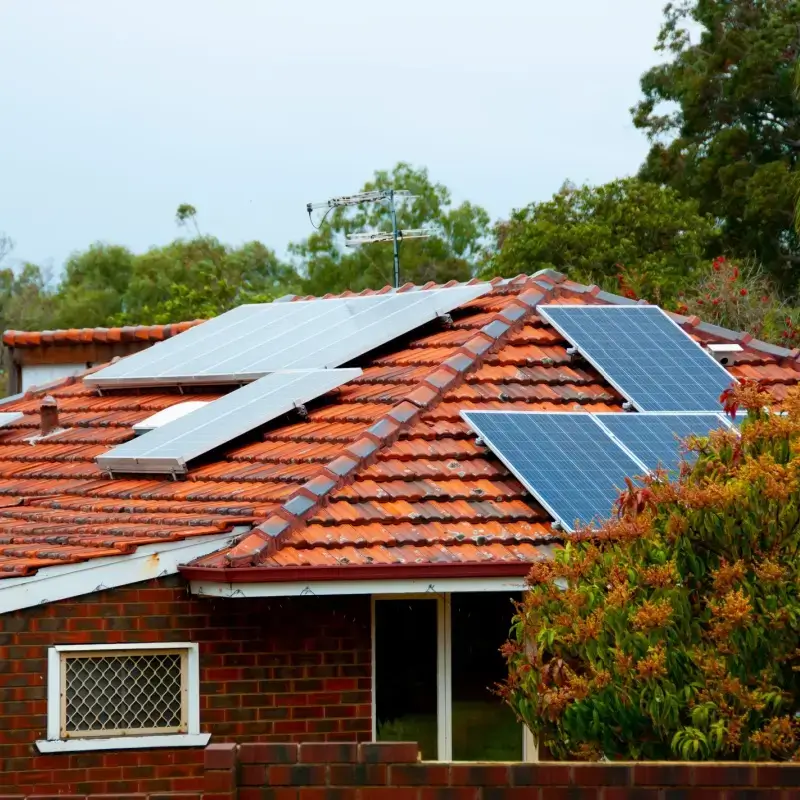Home / Compare Electricity & Ga… / Guide to solar rebates




Key takeaways
- Taking advantage of solar power through solar panels and solar batteries can be a great way to help save on your electricity bills.
- Some states in Australia may offer solar panel or battery rebates or incentives to help you get started with solar power.
- There may be eligibility criteria that you have to meet to access a solar rebate.
How does the solar rebate work?
While the rebate amounts may vary, the government initiative typically comes in two forms:
- Small-scale technology certificates. A federal government initiative, the Small-scale Renewable Energy Scheme offers small-scale technology certificates (STCs) to eligible households and small businesses for installing a solar photo voltaic (PV) system.1 STCs act like currency and are used to recoup some of the set-up costs. The amount of STCs you receive is based on several factors, including how much energy your new system will generate. Solar batteries are now also eligible for this scheme.
- State government grants and incentives. Depending on where you live, you may be eligible for a range of incentives, including grants and interest-free loans.
You can also discuss rebates and what you’re eligible for with energy retailers and installers when shopping around for a good deal on a solar power system. Learn more about energy concessions and rebates here.
What’s a solar feed-in tariff?
Once your solar panel system is installed and registered, you may be eligible to sell the excess electricity you generate back to the grid and receive a credit on your electricity bill. This process is known as a feed-in tariff (FiT) credit. The FiT is an ongoing rate which varies between energy providers, so it’s worth comparing electricity retailers to see if you can find a competitive rate.
Be aware that the how and when you can sell your excess electricity is changing. In the future, there may be restrictions on being able to export solar power at certain times of the day (e.g. during peak solar export periods) or you may be charged or penalised for this to incentivise exporting solar outside of these periods.
Solar rebates by state
Most solar rebates will vary depending on where you live. As of July 2025, here are the Australian states and territories that currently offer a rebate:
New South Wales
While individual apartment owners can’t apply for a rebate in NSW, a building owner or strata manager can apply for a grant to cover 50% of the purchase and installation costs of shared solar for the building for eligible residents.2
Australian Capital Territory
The ACT Government offers a partial rebate on the cost of purchasing and installing rooftop solar panels or other energy efficient appliances for eligible property owners. This rebate is only available to certain concession card holders so research before applying. The ACT Government also offers an interest free loan to help pay for the remainder of your solar PV system.3
Victoria
As part of the Solar Homes Program, the Victorian Government offers a solar panel rebate (with the additional option of an interest free loan) for eligible homeowners.4
Rebates are also offered to not-for-profit community housing organisations for properties they manage on the behalf of their tenants to help assist them with cost of living expenses.5 Similarly, for eligible rental property holders in VIC, they could get rebates on installing solar on their rental properties to assist the tenants with their electricity bills.6
Western Australia
Western Australia offers a battery rebate scheme for homeowners with Synergy or Horizon Power (rebate amount may vary depending on which energy provider you’re with).7 They also have interest free loans to help you invest in energy efficient technology including solar panels and solar battery systems.
Northern Territory
While there are no rebates for individual residents, the NT has a rebate for shared property management entities to install rooftop solar on an apartment or unit building so that the residents can benefit from solar energy.8
Other types of incentives
The Cheaper Home Batteries program is available across Australia to help those with solar panels with the cost of installing a solar battery by offering a discount of approximately 30% on the upfront cost of installation.9
Tasmania’s Energy Saver Loan Scheme offers no interest loans for helping Tasmanians afford solar panels and batteries or other energy efficient systems to lower the cost of living.10
Pros and cons of solar power
The benefits of a solar panel system
- Solar energy is renewable. Using solar power instead of fossil fuels (e.g. coal power) reduces carbon emissions, which is great for reducing your impact on the environment.
- Long-term money saver. How much you could save will depend on the size of your solar system, your electricity usage and the average amount of daylight you get in your area. It can also depend on the time of day you use solar and if you can store it in a solar battery. Using solar during the day, and at night if you have a battery, will positively affect your energy bill savings.
- Reduce dependence on the grid. Rely less on the power grid (especially during peak demand times), where the majority of Australians still receive their electricity supply.
- Increase home value. A product worth thousands of dollars and reduces your energy bill could be very attractive to potential buyers in the future.
The disadvantages of a solar panel system
- Set-up costs. The initial cost of buying a solar energy system – even with government rebates – is high but continues to reduce.
- Reducing solar feed-in tariffs. Minimal or no payback for exporting excess solar generated electricity to the grid can significantly extend the payback period of the upfront costs to install.
- Expiry date of STC scheme. While the STC scheme can help you save, it won’t be around forever. In fact, the rebate is decreasing year on year until it ends in 2030.
- Aesthetic. Depending on your tastes, you may not like the ‘look’ of solar panels on your roof or the amount of space they inhabit.
- Ongoing maintenance costs. An annual or bi-annual maintenance inspection is advisable to ensure all parts of your solar system are in good working order.
Getting your solar rebate
How do I apply for the solar rebate and install a solar panel system?
First, you’ll need to check you meet the eligibility requirements. This might include earning below a certain amount, being a concession card holder or not already having solar panels. You can check your eligibility for STCs via the Australian Government’s Clean Energy Regulator website, and your state’s eligibility requirements via their government website.
Second, you need to find a provider or installer. They can also quote eligibility, rebates, system sizes, connecting to the grid and overall cost. Gather multiple quotes (many companies offer prices with rebates) and compare before you select. Most of these retailers may offer an additional warranty on the whole system.
To find out more, check out our guide on solar installation.
What about solar hot water rebates?
The Small-scale Renewable Energy Scheme also offers STCs for other renewable energy systems such as solar hot water systems and heat pumps.1 Victoria offers a solar water rebate with a financial incentive of up to $1,400, provided you meet the eligibility criteria.11
While not strictly a solar hot water rebate, the NSW Government also offers a rebate for replacing your electric water heater with an air source heat pump water heater to improve your energy-efficiency and help the shift towards renewable energy.12
When does the federal government solar rebate end?
The federal government’s Small-scale Renewable Energy Scheme ends in 2030.1 Other solar rebates may come and go more frequently, so it’s always a good idea to check if there are any financial incentives in place before purchasing your solar power system or battery.
Installing solar power
How much does it cost to install a solar panel system?
The price you pay will depend on several factors, including:
- The size of the system, plus the brand (these vary a lot in costs, warranties and features)
- Your state and the terms of the rebates and incentives it offers
- The provider or installer you choose
- The average number of daylight hours in your location
- If you include a battery system.
It’s recommended you gather multiple quotes from Approved Solar Retailers and select the right option for your circumstances.
Is going solar worth it?
The answer to this question will depend on your circumstances. Although, if you can afford the upfront costs or repayments, it could be a money-saving option in the long term. What’s more, from a broader perspective, you’re shrinking your carbon footprint and, if you have a battery, reducing your strain on the grid.
If you can’t afford up-front costs, there may be solar rebates available to help cover some of the necessary fees. Another option is to go through retailers that offer to install solar panels for you, with the condition that you agree to be locked into a contract with them for a fixed number of years with an accompanying electricity plan.
Do solar panels require maintenance?
Conveniently, solar panels require very little maintenance. You just need to ensure dirt, leaves, debris or overhanging trees aren’t throwing shade over your panels and obstructing the sun’s rays. So, lightly cleaning your solar panels periodically (by a licensed professional) might be in order.
Do I need a solar battery?
If you want to rely more heavily on clean energy, a battery may be the solution for you. A solar battery can help you lower your electricity costs further by storing energy, which reduces the need to pay for energy usage from the grid at night when you’ve stopped generating your own electricity. However, your solar panel system can work fine without a solar battery system.
Solar batteries are expensive but can also save solar energy from being wasted during the day when you’re not home, so it’s worth weighing up your options. There are also different size options for battery storage, which will influence the cost and the amount of solar power you can store for home use.
Meet our energy expert, Meredith O’Brien
As the Head of Energy at Compare the Market, Meredith O’Brien believes in educating Australian customers about the everchanging gas and electricity market so they can adjust their energy usage habits and get the most out of their energy plans.
Meredith has six years within the energy industry, following 15 years of experience in financial services and is currently studying a Master of Business Administration. Meredith is a dedicated customer advocate who is passionate about empowering Australians to find the right products to suit their needs by removing the confusion from comparing.
1 Clean Energy Regulator – Australian Government. Small-scale Renewable Energy Scheme. Updated June 2025. Accessed July 2025.
2 NSW Climate and Energy Action – NSW Government. Solar for apartment residents. Updated July 2025. Accessed July 2025.
3 Everyday climate choices. Home Energy Support: Rebates for Homeowners. Accessed July 2025.
4 Solar Victoria – Victorian State Government. Solare panel (PV) rebate. Updated July 2025. Accessed July 2025.
5 Solar Victoria – Victorian State Government. Solar rebates for community housing. Updated April 2025. Accessed July 2025.
6 Solar Victoria – Victorian State Government. Solar rebates for rental properties. Updated July 2025. Accessed July 2025.
7 Government of Western Australia. WA Residential Battery Scheme. Updated July 2025. Accessed July 2025.
8 Northern Territory Government. Solar for Multi Dwellings Grant Scheme. Accessed July 2025.
9 Department of Climate Change, Energy, the Environment and Water – Australian Government. Cheaper Home Batteries Program. Updated July 2025. Accessed July 2025.
10 Tasmanian Government – Renewables, Climate and Future Industries Tasmania. Tasmania’s Energy Saver Loan Scheme. Accessed July 2025.
11 Solar Victoria – Victorian State Government. Hot water rebate. Updated July 2025. Accessed July 2025.
12 NSW Climate and Energy Action – NSW Government. Upgrade your hot water system. Updated July 2025. Accessed July 2025.

